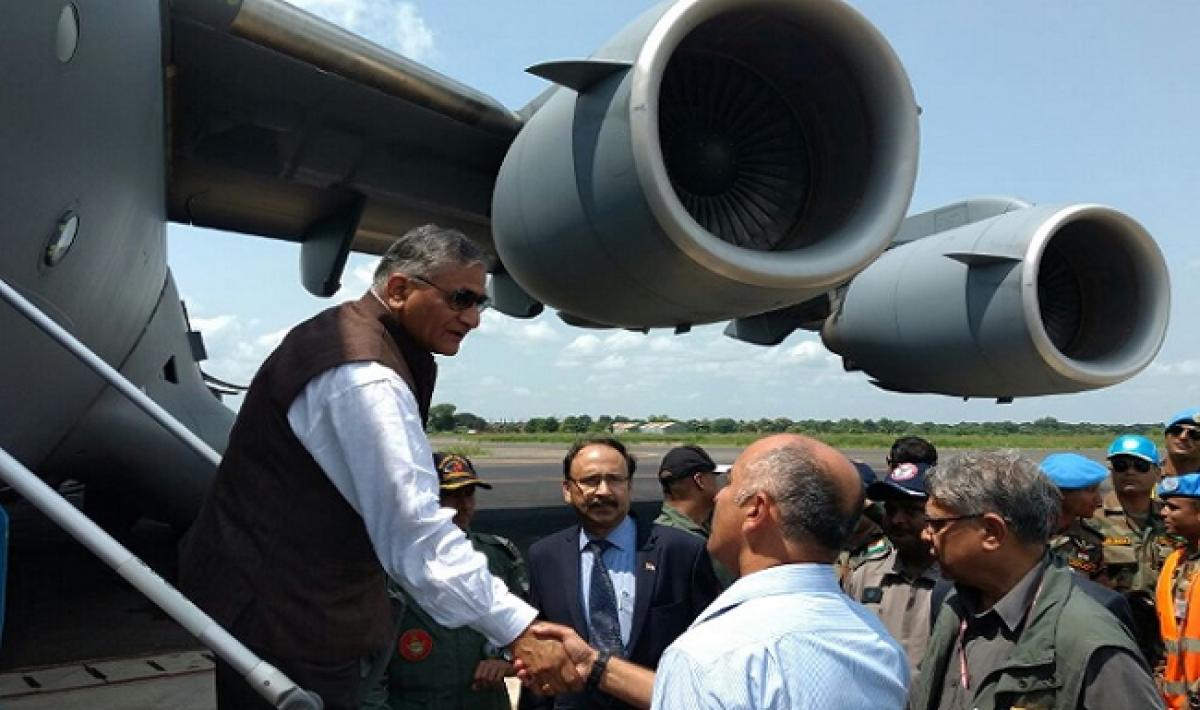Live
- A Soulful Celebration of Global Music
- Brahmin Community delegation felicitates CM Saini
- Allu Arjun Visits Chiranjeevi’s House for Lunch Meet
- Toyota organising TG Grameena Mahotsav
- Special rituals conducted at Maramma Temple
- Siddaramaiah has special love for Muslims: BJP
- We can’t afford spending less than 6% of GDP on healthcare
- Guinness World Record for continuous Hanuman Chalisa chanting
- REMOTE TRIBAL AREA TO GET NEW BRIDGE
- Dr LB College, Woxsen teams win in Climate Tank Accelerator event
Just In
There's good reason for India to do more than airlift a few hundred migrant workers in Sudan


The Indian government has done well to airlift out nationals stranded in South Sudan. Operation Sankat Mochan, co-powered by the ministry of external affairs (MEA) and the Indian Air Force (IAF), demonstrated a decisive ability. Decisive because in a similar situation, when Indians expected comparable assistance, the then Manmohan Singh government waffled.
The Indian government has done well to airlift out nationals stranded in South Sudan. Operation Sankat Mochan, co-powered by the ministry of external affairs (MEA) and the Indian Air Force (IAF), demonstrated a decisive ability. Decisive because in a similar situation, when Indians expected comparable assistance, the then Manmohan Singh government waffled.
Most Indians gave up on New Delhi and scampered to neighbouring Uganda, south of Juba, the capital of South Sudan. Those invested in South Sudan's land, the odd hotel, or a supermarket, wouldn't have left, anyway. Even this time around, the Indian nationals who've chosen to eject are ground workers contracted by multilateral agencies or ONGC Videsh.
There's good reason for India to do more than airlift a few hundred migrant workers. Beyond good optics and aggressive Facebook diplomacy by Gen. V.K. Singh, Minister of State for External Affairs, who led Sankat Mochan, lie two key economic interests.
The first pertains to oil.
Our investments via ONGC Videsh, at $135 million in 2003 -- once the government's largest gamble of foreign direct investment -- cannot be left to our Chinese partners. The aggregate of our oil investments since then, as per the Indian foreign ministry, is now $2.5 billion, spread over South Sudan and Sudan.
ONGC Videsh has 25 per cent participating interest in Greater Nile Oil Project Block 1, 2 and 4, in consortium with CNPC of China, Petronas of Malaysia and Sudapet of Sudan. It also has 24.125 percent participating interest in Block 5A in consortium with Petronas and Sudapet.
The Chinese control even the smallest part of the value chain. We clearly need to hold fort and safeguard our interests. But while we have been evacuating, Beijing looks a little more composed. Their evacuation numbers, as a percentage of total migrant workers, is a lot lower.
Our second economic interest lies in South Sudan's arable land, water and minerals.
Once the dust has settled down, these will remain a case of private investment and technology transfer as much as balancing out the near colonization of the country by the Chinese juggernaut of state-owned enterprises.
An important question remains whether the government heeded the clarion calls too quickly. The role played by social media, particularly Facebook, is case in point. It is an open secret that President Salva Kiir Mayardit and Vice President Riek Machar Teny don't want to run the government together.
It is Machar's rebellion that had caused the specter of evacuation even last time around. This time, under pressure from international interlocutors, the two agreed to meet at Mayardit's presidential palace. But before long, a spokesperson for Machar put up a Facebook post claiming that his boss has been taken hostage.
Hell broke loose in the Machar camp and a convoy of personal security guards, owing personal allegiance to him -- and not the institution, per se -- tried to storm in. Rumours flew around and it didn't help one bit that even ambassadors of South Sudan in different world capitals fanned the fire depending on which of the two leaders they owned allegiance to.
For a country that has celebrated only its fifth independence day, democratic institutions are far weaker than tribal ties. Rivalries between the Dinka and the Nuer are far too deep seated to be replaced in the immediate future. Under intense pressure to make up, Machar and Mayardit, both from opposing tribes, have now declared a joint ceasefire.
But most observers know that the two leaders say the right things only for external consumption. So, here's the point. Irrespective of how much social media platforms inflate the actual instability of the ground, Mayardit controls over 200,000 troops. Machar's forces are less than 2-5 per cent of this number. Plus, the international peacekeepers are obviously behind the ruling president.
Mayardit is an unreliable partner. In August 2013, he left Rashtrapati Bhavan high and dry and cancelled a visit to India at the last minute. In comparison, the frequency of his trips to Beijing are a part of public record. Mayardit finally came around and addressed the India-African Summit in New Delhi last year.
Real politick demands that India works with the ruler of South Sudan, irrespective of who he is. Here the task is cut out for External Affairs Minister Sushma Swaraj -- she could even redeploy Gen. V.K. Singh to Juba. The former army chief had visited Mayardit once before Sankat Mochan. The terrain now is our oil fields -- we shouldn't let them go on a platter.
By Rohit Bansal
(The author is Group Leader with Reliance Industries. He and travelled to and reported from South Sudan on numerous occasions. The views expressed are personal. Twitter @therohitbansal)

© 2024 Hyderabad Media House Limited/The Hans India. All rights reserved. Powered by hocalwire.com






